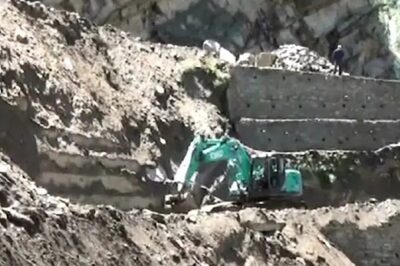
views
“We are given a warning whenever the Yamuna water level situation is about to get bad, but what about our crops? We still have to pay our dues…phir chahe ghar becho, bachche becho (either sell our houses, or sell our children, the debts must be paid)…," said Madhav*, a migrant farmer, as his family sits in their makeshift home under a flyover in Delhi. “The last time the Yamuna was this destructive was in 1978. I was four years old then, I am over 40 now."
The Yamuna rages in the national capital every monsoon, leaving the river beds and farmlands around it inundated. Settled in the rural plains/grasslands in the heart of Delhi, migrant farmers, labourers and cattle-owners leave behind their kachcha homes as soon as the orange alert is sounded and Yamuna water levels hit the evacuation mark. “We know it’s going to flood soon even when they don’t tell us in time," said Kamal*, another migrant farmer, adding, “Once the water begins to move on the land, it is a sign to drop everything and flee to safety."
That’s what his family, with hundreds more, did.
“We are 25 in total. We put our children on the shoulders, gathered our cattle and grabbed whatever we could," he added, mentioning the lack of help in the evacuation process. “We couldn’t carry any clothes when we left. Even if we could bathe, what would we change into," asks his otherwise quiet mother. “No, they deliver the water every day. We are many, so we have to be judicious about how we use it," Kamal said.
While sustaining daily wage work and arranging food is a challenge during the day, mosquitoes and other insects make a proper night’s sleep a distant dream. With rainfall, water-borne diseases such as malaria, dengue and insect bites become more prevalent.
‘ACCHE LOG…’ TO ‘SAAPON KO HATAAYENGE’
Sitting uncomfortably in their temporary houses, farmers explain how maintaining basic hygiene is also an issue due to shortage of water and other resources. “Achhe log hi gareeb ka sahara hain," Kamal’s neighbour from the next khaat tells News18 how good samaritans and NGOs have stepped in to help. “A man comes every morning and delivers water, but it is limited as he does it in personal capacity."
As personal vehicles, politically painted tempos or the langar from gurdwaras, approach them, the children, however, get excited.
Harinandan, a specially-abled migrant farmer from Badayun, was stuck without any food or shelter, as he saw the flood snatch his home till his family rescued him after five days. “The house we had was swept away," said Siyaram, as his family, including seven women and three men, sits on an uneven charpai. “What used to be our house is now occupied by snakes, flies and mosquitoes," he said.
His wife said, “Pehele saanpon ko hatayenge (first we will clear the snakepit)." Giggling with her sister, she said that they “kill them with their bare hands", wondering how city dwellers passing right by would squeal at the thought.
TIME TO REBUILD
“It will take a minimum of Rs10,000-15,000 worth of wood, bamboo and tarpaulin to rebuild," said Madhav, as he looked at his now impatient wife, who knows she will be the one setting up the new home on the same shaky ground. She repeats this process every year. “Making it a home requires grit, knowing its low-shelf life in the face of floods," he said. “What we left behind would have reached two km away by now," said Madhav, expressing gratitude that at least his family members survived.
Meanwhile, Kamal’s livelihood remains a question. “Crops have been destroyed due to the waterlogging, and we paid whatever we had left to get our cows back. During the elections, they fold their hands asking for votes, but what about when we need their help," he asked.
“Delhi has witnessed unforgiving rains thrice this year," said his wife. “We have rebuilt our home thrice."
Amid the political blame game on whether the banks were ‘strengthened’ after the 1978 Delhi floods or the controversial mismanagement of the water flow from Hathnikund barrage, the daily wage migrant workers continue to suffer. Madhav’s reply to all of this is: “Who cares about the poor?"
*Names withheld to protect identity




















Comments
0 comment